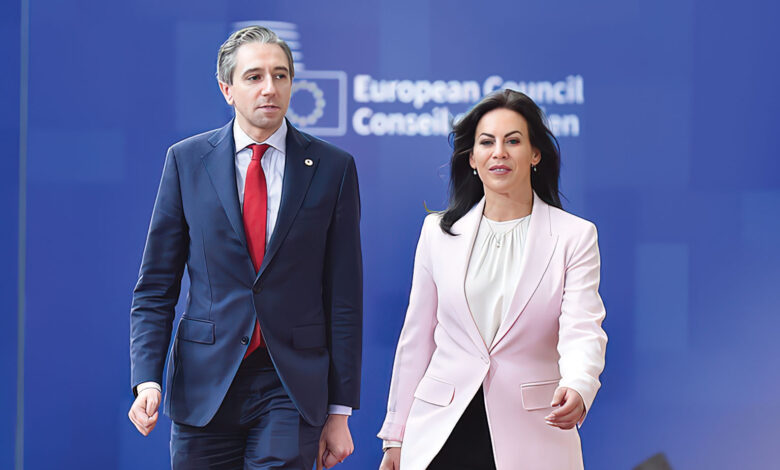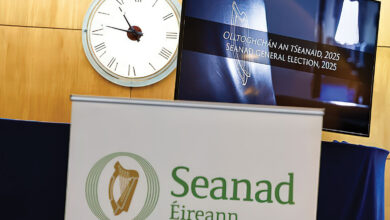Ireland’s latest foreign policy priorities

As Ireland prepares to assume the Presidency of the Council of the European Union in 2026, Tánaiste and Minister for Foreign Affairs Simon Harris TD has outlined the Government’s foreign policy priorities for the coming years.
Speaking in Dublin on 13 February 2025, Harris emphasises the Government’s position on Ireland’s role at the heart of the European project and its responsibility in shaping the future of the EU amidst global uncertainty.
The Tánaiste reiterates the Government’s longstanding position that Ireland’s membership in the EU is central to its economic and geopolitical stability. “Ireland in 2025 is deeply fortunate to be at the heart of the greatest peace project that the world has known,” he states, further asserting that the EU has been a catalyst for social progress, economic growth, and political stability, and Ireland has been an active participant rather than a passive beneficiary.
The Fine Gael leader also highlights Ireland’s role in shaping EU policy, emphasising how the State has played a leading role in on broad policy challenges. “Our fingerprints are on the Union of today and our imprint on the blueprint for tomorrow,” he says.
Harris acknowledges the shifting geopolitical landscape, particularly amid the return of President Donald Trump in the United States and its implications for transatlantic relations. Harris emphasises the need for a united European approach in responding to global challenges, including shifts in global trade and security threats.
“My own department [DFA] has been expanded to encompass trade in recognition of the priority we are attaching to this area and in light of the policy developments in the USA,” he says.
Following discussions with EU trade ministers, Harris expresses optimism about continued engagement with the US but warned of the dangers of further escalation in trade disputes.
“There is a window for negotiation,” he says, underlining the importance of diplomacy in maintaining economic stability.
Security and defence
Ireland’s approach to security and defence has evolved in the wake of Russia’s invasion of Ukraine. While maintaining its policy of military neutrality, the Government has committed to strengthening national security and increasing military cooperation within the EU.
“Security and defence matters. There is no shying away from this,” Harris says. He also reiterated Ireland’s commitment to providing aid to Ukraine in the wake of Trump deciding to meet Russian dictator Vladimir Putin without the input of European countries or the Ukrainian president, Volodymyr Zelenskyy. “A bad deal for Ukraine is a bad deal for all of us,” the Tánaiste says.
Domestically, the Government is advancing key initiatives including a National Security Strategy, a National Maritime Security Strategy, and a significant increase in the defence budget to €1.5 billion by 2028.
“Ireland is more than ready to play that leadership role to strengthen European security in all its dimensions,” Harris declares, reinforcing that security is “not just a military issue but also extends to economic resilience, digital safety, and protection against hybrid threats”.
EU enlargement
The Tánaiste states that Ireland remains committed to the integration of new member states, particularly in the western Balkans. Harris announced the development of a new Irish strategy for the region, including the opening of diplomatic missions in Serbia, Bosnia and Herzegovina, and Moldova.
“At its core, the EU is a union of values and it is a promise of a better future built together,” he says, emphasising that EU enlargement is “not just about economic opportunity but also a security imperative for Europe”.
To support this, the Irish Government has established its Fund for Enlargement and European Values, aimed at assisting candidate countries in their EU accession processes. “Ireland is an example of successful enlargement. We are determined to continue to ensure that other countries can also fulfil their potential within the European family,” Harris affirms.
Economic competitiveness
Economic competitiveness is another key priority for Ireland’s foreign policy. Harris describes two 2024 reports on competitiveness and the single market by two former Italian prime ministers – Enrique Letta and Mario Draghi – as “milestone documents”.
The Tánaiste states that Ireland’s competitiveness strategy focuses on four areas:
- strengthening the Single Market, particularly in services;
- investing in EU-wide grid infrastructure;
- supporting SMEs in scaling up; and
- reducing regulatory burdens while maintaining environmental standards.
Harris signals that Ireland would continue to advocate for these priorities within the EU, working closely with European Commission President Ursula von der Leyen and Irish Commissioner Michael McGrath on upcoming regulatory proposals.
Strengthening diplomatic relations
Stating that Ireland’s commitment to multilateralism remains strong, the Minister for Foreign Affairs says that he will work to deepen bilateral ties with key partners, pointing to the success of the Global Ireland Strategy, which has enhanced Ireland’s diplomatic and economic presence worldwide.
He announces that the Government will expand its successful Nordic strategy to include the Baltic region, strengthening ties with Estonia, Latvia, and Lithuania. He also highlighted the untapped potential in Ireland’s relationship with Poland, describing the country as “an incredible country which is home to a very large so-called reverse diaspora.”
Additionally, Harris welcomed the renewed relationship between the EU and the UK, emphasising the importance of collaboration with Prime Minister Keir Starmer’s government. “We shape the Union – not alone, but with partners,” he says, underscoring Ireland’s role as a “bridge between the EU and the UK”.
Looking ahead
As Ireland gears up to host the EU presidency, the new Minister for Foreign Affairs emphasises that this will be an opportunity which “must be embraced”. “We are going to make the most of this rare opportunity. It is an exciting moment,” he says
He concludes with a call to action: “Let us seize this moment and do something really special – special for Ireland and special for the EU.”
Harris’s entry to the Department of Foreign Affairs coincides with its new emphasis on trade, suggesting that the new government’s priority is to enhance trade and focus on making Ireland a country to attract FDI in light of the new administration in the United States, the continued fallout of Brexit, and the focus on international justice in Palestine and Ukraine which had been the Department’s priority towards the end of Micheál Martin’s spell as Foreign Affairs Minister.





